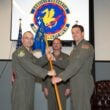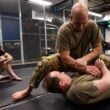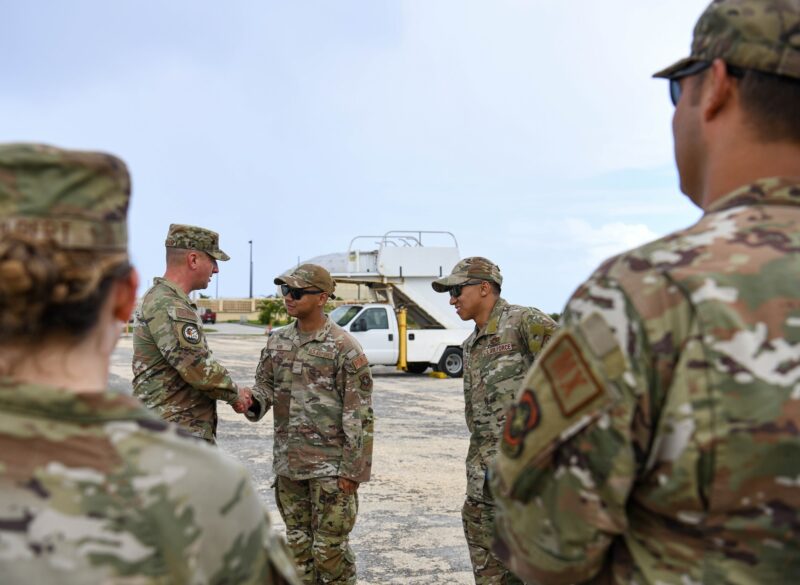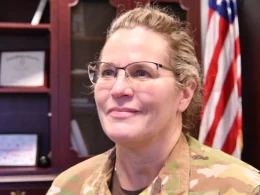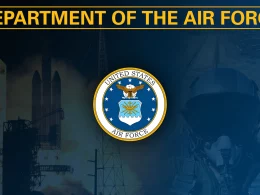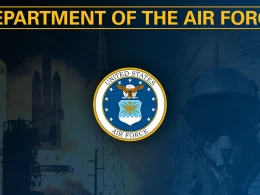ANDERSEN AIR FORCE BASE, Guam —
Just under six months following typhoon Marwar, the U.S. Air Force Expeditionary Center and 515th Air Mobility Operations Wing command team visited the 734th Air Mobility Squadron, Dec. 2, 2023, at Andersen Air Force Base, Guam, to witness firsthand the persisting impacts of the storm and the recovery efforts that have since been made.
While evolving to orient towards the pacing challenge, Airmen at Andersen AFB are now faced with new obstacles to delivering rapid global mobility.
“The mission has been impacted since the typhoon in May,” said 2nd Lt. Rodolfo Faccini, 734th AMS passenger services officer in charge. “There is no telling when we will have a complete recovery.”
The category four typhoon Marwar, struck Andersen AFB and the island of Guam for eight relentless hours with winds reaching 140 mph and up to 28 inches of rain, May 24, 2023. Following the storm, Andersen AFB reported over $2 billion worth of damages and for the mobility Airmen this meant a completely inoperable passenger terminal.
Serving as the second busiest aerial port terminal in the Indo-Pacific region, the 734th AMS is responsible for protecting national interests by airlifting cargo and personnel within the theater, and they are expected to seamlessly carry out that mission every day.
“Every day after the storm, I remember coming into work thinking it can’t get any worse than this and we would end up having to move again,” said Airman Juan Nava, 734th AMS passenger service agent. “On top of cleaning the damage from the typhoon, we had to relocate three times, taking all our equipment with us each time.”
Facing facility damage, equipment damage and month-long power outages, were just a few of the obstacles that Airmen faced.
Embodying the character of mobility warriors, Airmen not only met their mission requirements but also spearheaded critical relief efforts that exceeded expectations.
“Challenges we faced were just challenges we overcame and an opportunity to become better at what we do,” said Maj. Patrick Morris, 734th AMS director of operations. “We became the lifeline for supplies for the island the first few, critical days.”
Despite disrupted supply chains, critical shortages of food, fuel and power, the 734th Airmen kept the aerial port operational.
The unit received 134 aircraft ranging from passenger planes and commercial airliners to U.S. Navy and foreign partner aircraft. They help facilitate the arrival of 906 personnel, including aid workers, and helped 576 people evacuate the island and handled more than 1.8 million pounds of cargo, including vital humanitarian aid.
“Knowing that we were the lifeline for the island, we knew we could not fail,” Morris said. “Even when the rest of the base took a day to ‘take a knee,’ the Airmen were pushing pallets off Federal Emergency Management Agency aircraft so our communities could get the relief they needed.”
Through this trial, mobility Airmen persevered and ultimately showed they can accomplish any task necessary to carry the mission forward: delivering rapid global mobility, anytime, anywhere.
Today, these mobility warriors are truly shaping the future of the Air Force, by excelling at any operation they are called to, under any and every circumstance.
“This team is the definition of flexible,” Nava said. “Even to this day, we’re thrown unique challenges being in our temporary passenger terminal.”
As the passenger services flight relocated three times, each time they were facing new and unique challenges from the locations they were operating out of.
“The mission is still being impacted, but you wouldn’t know that from looking at our statistics,” Morris said. “We are able to move more jets and have gotten more training done since the initial recovery operation that we were doing before the storm.”
Maj. Gen. John Klein, USAFEC commander and Chief Master Sgt. Courtney Freeman, USAFEC command chief, concluded the day with renewed confidence in the Airmen’s ability to accomplish any mission they are called to.




